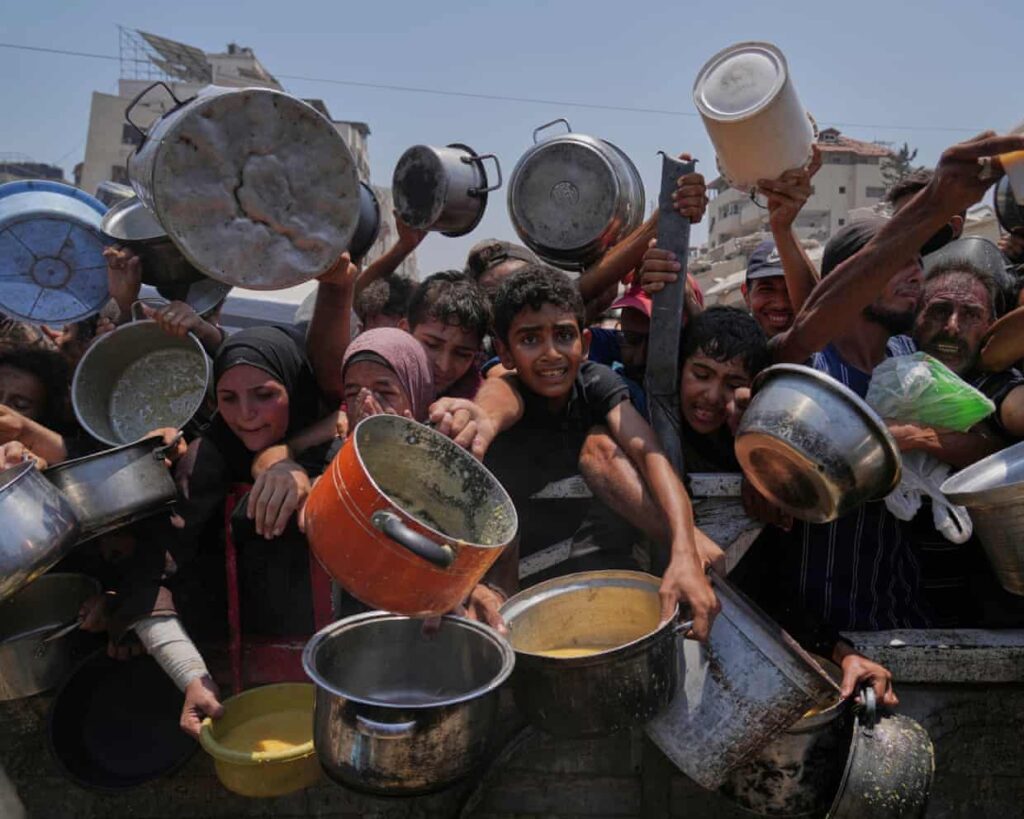
At least 57 people were killed in Gaza over the past 24 hours, primarily due to Israeli airstrikes and chaotic scenes as civilians sought humanitarian aid. This surge in violence coincides with a breakdown in ceasefire negotiations, sparking concerns over a worsening starvation crisis in the region. Many victims were shot while waiting for aid trucks near the Zikim crossing into Israel, as the population grapples with the dire consequences of ongoing hostilities.
Reports indicate that the humanitarian situation is deteriorating rapidly. The Palestinian news agency has stated that at least 124 individuals have died from starvation, with 84 of those being children. Recent distressing news includes the death of an infant from malnutrition, marking the third child to die from hunger within a single day. Israeli airstrikes continue to claim lives across the Gaza Strip, including four fatalities in an apartment building in Gaza City on Saturday.
The collapse of ceasefire talks has left many questioning the motives behind the actions of both Israeli and Hamas officials. Negotiations stalled after the United States and Israel withdrew their teams from discussions in Doha on October 7, 2023. President Donald Trump attributed the failure to Hamas, suggesting the group lacked interest in reaching a deal. In response, Israeli Prime Minister Benjamin Netanyahu hinted at exploring “alternative options” to ceasefire discussions, although he did not specify what these might entail.
Hamas officials have rejected claims of responsibility for the impasse, framing the withdrawal of U.S. and Israeli negotiators as a tactical maneuver. Senior Hamas official Taher al-Nunu expressed surprise at Trump’s comments, noting that meaningful progress had been achieved in some negotiation areas prior to the breakdown. Disagreements persist over the positioning of Israeli troops during a potential ceasefire, access to aid in Gaza, and the exchange of Palestinian prisoners for Israeli hostages.
As negotiations falter, the humanitarian crisis deepens. The World Food Programme reported that over 90,000 women and children urgently need treatment for malnutrition, with one in three residents of Gaza going days without food. Rania al-Sharahi, a 44-year-old mother of six who is pregnant, described her struggle to feed her children and the desperation that comes with searching for water and food. “As for bread, we don’t even talk about it any more. It has become a luxury,” she lamented, emphasizing the dire conditions faced by families in the region.
Despite the alarming reports from Gaza, Israeli officials have minimized the starvation crisis, suggesting that a coordinated media campaign is tarnishing their image. They assert that aid is available but blame the United Nations for its distribution failures. The UN has countered, stating that distributing aid in Gaza has become increasingly challenging due to the restrictions imposed by Israel. Reports indicate that Israel has approved only a fraction of the aid requests made by the UN, resulting in significant delays in aid delivery.
Since lifting its total blockade in May, Israel claims to have allowed 4,500 aid trucks into Gaza, averaging about 70 trucks daily. This figure falls far short of the pre-war total of 500 trucks per day, raising concerns among humanitarian organizations about the adequacy of support. Images of starving children have intensified global scrutiny on Israel, prompting renewed calls for action.
In a recent development, Jordan announced plans to conduct airdrops of humanitarian aid, primarily food and milk formula. This marks a shift in strategy as international leaders, including UK Prime Minister Keir Starmer, seek to address the urgent need for assistance in Gaza. Starmer noted that he is “working urgently” with Jordan to facilitate British aid, amidst increasing pressure to formally recognize a Palestinian state.
Criticism of the airdrop strategy has also emerged, with Philippe Lazzarini, head of the UN Relief and Works Agency for Palestine Refugees (UNRWA), labeling it a “distraction.” He emphasized that airdrops are inefficient and do not adequately address the underlying issues of starvation. Lazzarini’s comments reflect the urgent need for a comprehensive solution to the humanitarian crisis in Gaza.
As the international community grapples with the situation, France announced its intention to recognize a Palestinian state at the upcoming UN General Assembly in September. This decision signals a potential shift in diplomatic relations and aims to rally support from other European nations. In contrast, Italian Prime Minister Giorgia Meloni has stated that Italy will not recognize a Palestinian state until it is established, highlighting the complexities of international diplomacy surrounding the crisis.
The ongoing conflict has resulted in nearly 60,000 deaths in Gaza since Israel launched a military operation in response to the Hamas-led attack on October 7, 2023, which claimed approximately 1,200 lives in Israel. As violence continues and humanitarian needs escalate, the path to peace and stability remains fraught with obstacles. The urgent need for aid and a lasting resolution to the conflict is more pressing than ever.






